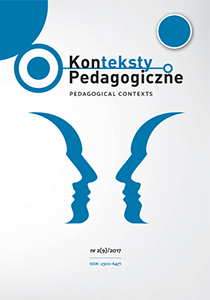Abstract
The paper analyses the value of the virtual learning environment in terms of enhancing motivation for learning. The author takes into account two selected motivational theories: theory of goals and selfdetermination theory. The implementation of education in a virtual environment refers to the assumptions of these theories. It is assumed that the use of digital technology in education supports the learning process and is a good way to build positive motivation to learn.
References
Ames, C. (1992). Classrooms: Goals, Structures and Student Motivation. Journal of Educational Psychology, 84, 261–271.
BorawskaKalbarczyk, K. (2016). Kreowanie kompetencji informacyjnych uczniów jako warunek urzeczywistniania życia wartościowego we współczesnej infosferze, materiał niepublikowany, IX Zjazd Pedagogiczny „Ku życiu wartościowemu. Idee – koncepcje – praktyki”. Białystok.
Brophy, J. (2004). Motywowanie uczniów do nauki, przeł. K. Kruszewski. Warszawa: Wydawnictwo Naukowe PWN.
Deci, E.L. i Ryan, R.M. (1985). Intrinsic Motivation and Self-Determination in Human behaviour. New York: Plenum.
Deci, E.L. i Ryan, R.M. (2000a). The “What” and “Why” of Goal Pursuits: Human Needs and the SelfDetermination of Behavior.Psychological Inquiry, 11, 227–268.
Ford, J. (1992). Motivating Humans: Goals, Emotions and Personal Agency Beliefs. Newbury Park: Sage.
KadzikowskaWrzosek, R. (2011). Wytrwałość i skuteczność działania – wpływ konteks tu sytuacyjnego i siły woli.Roczniki Psychologiczne, 14(2), 159–187.
Kołodziejczyk, W. i Polak, M. (2011). Jak będzie zmieniać się edukacja: wyzwania dla polskiej szkoły i ucznia. Warszawa: Instytut Obywatelski.
Kupisiewicz, Cz. (2005). Definicja, przedmiot i zadania dydaktyki w świetle współczesnych badań niemieckich. W: A. Karpińska (red.), Edukacyjne obszary „głębokiej zmiany” w dialogu i perspektywie (s. 25–42). Białystok: Trans Humana.
Marshall, H.H. (1994). Children’s Understanding of Academic Tasks: Work, Play, or Learning. Journal of Research in Childhood Education, 9(1), 35–46.
Pulak, I. (2010). Personal Learning Environment w praktyce, czyli jak zaprojektować własne cyfrowe środowisko kształcenia. W: J. Morbitzer, Człowiek, media, eduka-cja. Kraków: Uniwersytet Pedagogiczny im. KEN w Krakowie, http://www.ktime.up.krakow.pl/ref2010/pulak.pdf [dostęp: 16.03.2017].
Ryan, R.M. i Deci, E.L. (2000b).SelfDetermination Theory and the Facilitation of Intrinsic Motivation, Social Development, and WellBeing. American Psychologist, 55, 68–78.
Sysło, M.M. (2014). Kierunki rozwoju edukacji wspieranej technologią. Nowe technolo-gie w edukacji. Propozycja strategii i planu działania na lata 2014–2020. Wrocław–Toruń–Warszawa.
Sysło, M.M. (b.r.). Wirtualne środowiska spersonalizowanego kształcenia,http://mmsyslo.pl/content/download/898/4115/version/1/file/Wirt_%C5%9Arod_MMSyslo.pdf [dostęp: 14.03.2017].
Topol, P. (2012). Wszechobecne środowiska uczenia się. Studia Edukacyjne, 20, 223–238.
Wojtowicz, E. (2014). Motywowanie do szczęścia poprzez wspieranie autonomii dziecka – perspektywa teorii autodeterminacji. Kwartalnik Naukowy Fides et Ratio, 19(3), 29–37.
In accordance with the recommendation of the Ministry of Science and Higher Education, which aims to counteract the practice of “ghostwriting” and “guest authorship,” all authors submitting their text for publication should attach an author’s statement which declares the contribution of each of the authors to the article. The printed and signed statement should be delivered by mail or other means to editor-in-chief Joanna Skibska or sent in the form of a scan to the following e-mail address: redakcja@kontekstypedagogczne.pl. The authors will not receive remuneration for publishing their papers. The editors reserve the right to make minor editorial changes to the articles which will not affect the substance of the article. We encourage all authors to prepare their articles in accordance with the guidelines for manuscript preparation. Download pdf file.
Authors transfer all copyrights and grant the journal the right of first publication with the work simultaneously licensed under a Creative Commons Attribution License that allows others to share the work with acknowledgement of the work's authorship and initial publication in this journal. All authors agree to the publishing of their email addresses, affiliations and short bio statements with their articles during the submission process.

